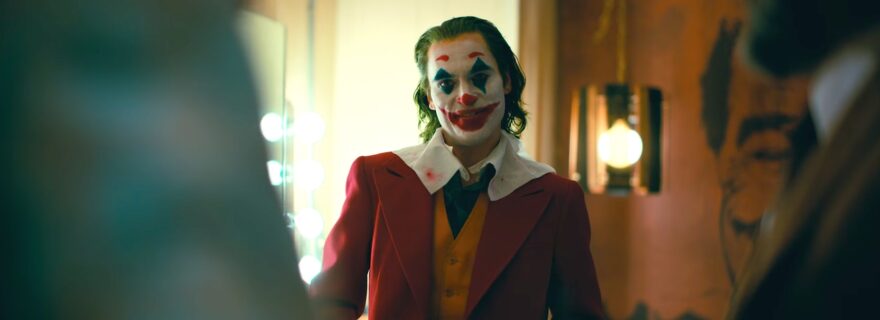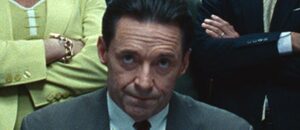Joker
Movie Rating:
4.5
Midway through Joker, Joaquin Phoenix dances as he traipses down a New York staircase, and the soundtrack pounds to “Rock and Roll Part 2,” an anthem played at almost every sports arena for decades. The song’s performer, Gary Glitter, was charged multiple times in the 1980s and ’90s for child porn, abuse, and attempted rape. Beneath the benevolent drum hook beats the heart of a deviant monster.
As social commentary, Joker’s wild theatrics will certainly divide audiences. Some will champion the movie’s anarchic character and find sympathy in the character’s pain and illness. There’s a scribble in Arthur Fleck’s notebook, wondering why people are surprised that someone who’s mentally ill would behave in ways that are shaped by that illness, and that will be a let-off for the behavior. Others, many without seeing the film, will simply have nothing to do with it, believing that giving voice to this monster is to endorse the evil.
On a story level, this is basically the transition from psychopath to sociopath, about a person struggling with his feelings (wrought by abuse and deficiencies) who discovers that he can gain community through his own pain and violence. It’s not a pleasant message, and it questions some fundamental tenets of Liberal humanistic faith, whereby the general goodness of people is supposed to be the curve to which our society is bending.
The film is hardly a clarion call to the ignorance and rampage it explores. Joker is of course the hero of his own story, and merely seeing things from his vantage is not an endorsement. To the film’s credit, it draws that line deliberately throughout. We’re made to feel uncomfortable, constantly, with the manifestation of the character’s madness.
The movie makes overt references to antiheroes from Martin Scorsese’s filmography. Taxi Driver and The King of Comedy loom large. The early 1980s setting evokes the darkened underbelly of Reagan’s America, the same rot that gives After Hours its underlying sense of doom. There are also nods to Sidney Lumet’s Network, twisting that film’s anarchic glee to the tyranny of mob violence, shifting allegiances in fascinating ways.
Joaquin Phoenix’s physicality is astonishing. His starvation-induced serpentine look is both creepy and anxiety-inducing. His cackling nervous laugh is anything but comedic. He inhabits the role with a bleak darkness, yet somehow feels human throughout. While Heath Ledger’s immense performance in The Dark Knight played Joker as a kind of disruptive force of nature, with neither beginning nor ending but just chaos meant to make orderly things blow up, Phoenix’s character gives us a man whose violence and cries of pain are shared by entire communities. He pits rich against poor and twists the notion of resistance into anarchic calls for revolution and revenge.
The Hangover director Todd Phillips may not have been an obvious choice to tackle this material, but he manages to guide the film in surprisingly deft ways. Lawrence Sher’s almost documentary-like cinematography is sublime, Hildur Guðnadóttir’s score eschews the Hans Zimmer pomp and sets an unsettling mood without cliché, and Mark Bridges’ costume design is pitch perfect.
Joker never loses its contained state of angst. The film never devolves into comic book fare in the traditional, pulpy sense. It’s a taut spring that winds and winds, as unsettling a work as any studio production this year. As a result, it’s sure to be maligned by many, and adored by some who will find solace in their own inadequacies. Whether a movie is to be judged by its worst fans is a conversation for another article, but plenty will be said on that topic that is, at best, unhelpful.
Joker is meant to open up discussion, not close it. It’s a challenging, provocative film that’s more than just a grenade lobbed to cause mayhem, but a precise and probing look into the origins of a killer. This is the collision of art house with blockbuster, exactly the kind of movie that people say isn’t, or even can’t be, made any more. The vintage Warner logo evokes that nostalgic feeling, but no film this year will feel more 2019 than this one.
Joker is no joke. The film challenges our emotions and prods at some fundamental ideas and biases. It’s a complex tale told with sophistication and nuance, far quieter and more precise than the rhetoric will surely be. Go in with as much of an open mind as possible. Be prepared to be repulsed and drawn in with equal measure, and to see one of the most powerful and provocative films of the year.






Arturo Lugo Gonzalez
Goddamn! Amazing review. The hype for this one is almost unsustainable. Will be there on opening day.
William Milby
It does pretty much sound like the king of comedy in many ways.
Nate
How bloody is it exactly? Like graphic disgusting torture violence that is celebrated? Or just brutal like and part of the story?
Chris B
I’m in. Whether I love it or hate it, this is one I gotta see.
Tom Landy
I don’t really like the idea of a Joker origin story personally. What makes him a very terrifying villain is that he’s shrouded in mystery, so this takes that away but I’m curious to see it for Phoenix and being well-made anyway.
Josh Zyber
I do like the notion that this isn’t supposed to be the *only* Joker origin story. It’s not part of the Justice League cinematic universe. DC has essentially taken the approach that Joker is an idea. There can be many different, contradictory stories about him. Burton’s Batman had one origin. Nolan’s Dark Knight had another (or none). The Gotham TV series had multiple Jokers. Suicide Squad’s Joker was very different than any of the others.
To that end, he is still shrouded in mystery, because you can never know which (if any) of the stories are the “true” origin. Meanwhile, Batman’s origin is pretty consistent across all tellings.
That’s a clever premise, IMO.
EM
Iʼm still a Cesar Romero guy.
Jeff Blumfield
Went with all the jazzed up feeling and found a loud, vacuous, highly self-absorbed film. Much better fare at TIFF this year than this overhyped tripe.